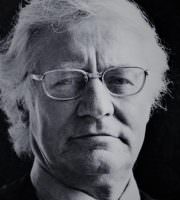by Robert Bly
1924
Today, lonely for my father, I saw
a log, or branch,
long, bent, ragged, bark gone.
I felt lonely for my father when I saw it.
It was the log
that lay near my uncle's old milk wagon.
Some men live with a limp they don't hide,
stagger, or drag
a leg. Their sons often are angry.
Only recently I thought:
Doing what you want…
Is that like limping? Tracks of it show in sand.
Have you seen those giant bird-
men of Bhutan?
Men in bird masks, with pig noses, dancing,
teeth like a dog's, sometimes
dancing on one bad leg!
They do what they want, the dog's teeth say that.
But I grew up without dog's teeth,
showed a whole body,
left only clear tracks in sand.
I learned to walk swiftly, easily,
no trace of a limp.
I even leaped a little. Guess where my defect is!
Then what? If a man, cautious,
hides his limp,
somebody has to limp it. Things
do it; the surroundings limp.
House walls get scars,
the car breaks down; matter, in drudgery, takes it up.
On my father's wedding day,
no one was there
to hold him. Noble loneliness
held him. Since he never asked for pity
his friends thought he
was whole. Walking alone he could carry it.
He came in limping. It was a simple
wedding, three
or four people. The man in black,
lifting the book, called for order.
And the invisible bride
stepped forward, before his own bride.
He married the invisible bride, not his own.
In her left
breast she carried the three drops
that wound and kill. He already had
his bark-like skin then,
made rough especially to repel the sympathy
he longed for, didn't need, and wouldn't accept.
So the Bible's
words are read. The man in black
speaks the sentence. When the service
is over, I hold him
in my arms for the first time and the last.
After that he was alone
and I was alone.
Few friends came; he invited few.
His two-story house he turned
into a forest,
where both he and I are the hunters.
Last updated October 09, 2022




